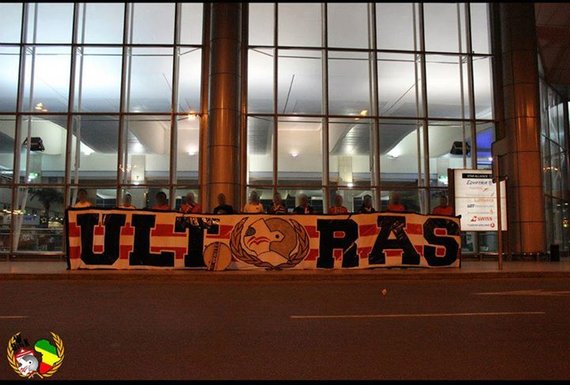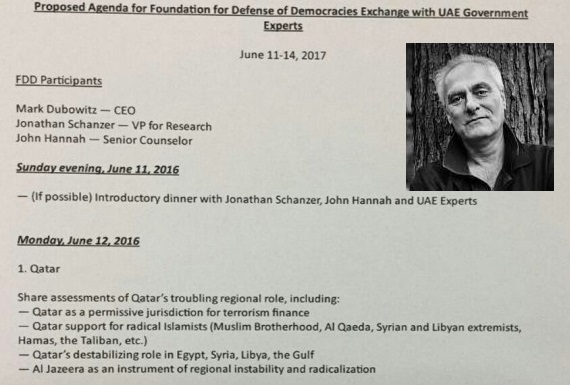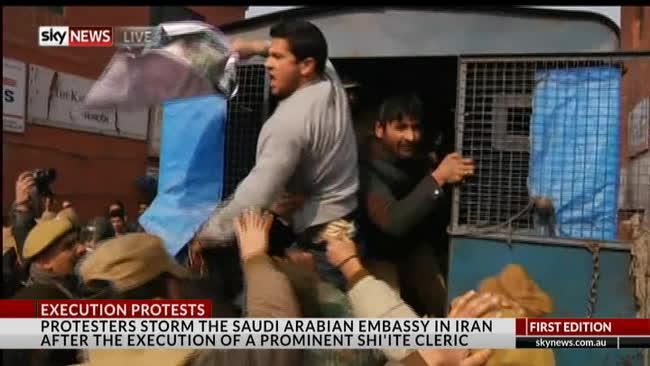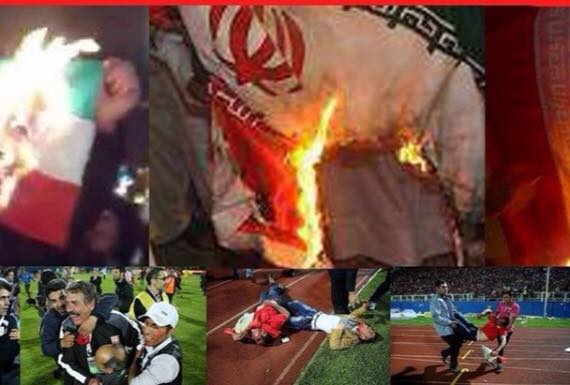Egypt bans ultras in bid to break anti-government protests

By James M. Dorsey
An Egyptian court has banned militant soccer fan groups or ultras as terrorist organizations in a bid to break the backbone of anti-government protests.
The ruling at the request of Mortada Mansour, the controversial, larger than life president of Cairo’s storied Al Zamalek SC who alleged that his club’s ultras, the Ultras White Knights (UWK), tried to assassinate him, pushes further underground groups that often offer despairing youth a rare opportunity to vent their pent-up anger and frustration peacefully.
Ultras have for the past eight years been at the core of anti-government protest in Egypt. They have been the drivers of student protests in the last two years against the regime of Abdel Fattah Al Sisi, the general-turned-president who in 2013 toppled Mohammed Morsi, Egypt’s first and only democratically elected president.
Mr. Morsi was sentenced to death on Saturday, the same day that the ultras were banned, on charges of conspiring with foreign militants to break out of prison during Egypt’s uprising four years ago.
Anti-Sisi protests in universities have largely been suppressed with security forces taking control of campuses, but ultras still play a key role in flash demonstrations on Friday’s in popular neighbourhoods of Egyptian cities.
Thousands of fans and students have been arrested and large numbers have been expelled from universities. Anas El-Mahdy, a 21-year old second year Cairo University physical therapy student, died on Saturday from injuries sustained in April during campus clashes between students and security forces.
Mr. Mortada prides himself on having asked security forces in February to intervene to prevent fans from entering a Cairo stadium without tickets. He charged that UWK had been paid to provoke a confrontation with security forces. Twenty fans were killed in the incident in which security forces used tear gas and birdshot against fans who had been cornered in a cul-de-sac.
In response to a journalist’s question about how the fans had died, Mr. Mortada responded: “Ask the Muslim Brotherhood,” the group of Mr. Morsi that has been banned as a terrorist organization and brutally repressed by Mr. Sisi. The court most probably accepted Mr. Mortada’s assertion that ultras are terrorists on the grounds that many of the protesters against the Sisi regime define themselves as Islamists, some of whom are members of the Brotherhood.
Sixteen ultras and alleged members of the Muslim Brotherhood were recently sentenced to prison terms in connection with the incident at Cairo’s Air Defence Stadium.
Security forces further arrested in March 52 students and UWK members who participated in a protest at Fayoum University. Twenty one of those arrested were handed over to the prosecution on charges of belonging to a terrorist organization and violating Egypt’s draconic anti-protest law. Police separately arrested UWK leader Said Moshagheb on charges of having been part of the UWK group that stormed Zamalek’s offices and tried to assassinate Mr. Mansour. The UWK has confirmed the storming but repeatedly denied having attempted to kill Mr. Mansour.
Linking the ultras with their tentacles in the student movement is rooted in the history of a movement that since the crackdown on the Brotherhood by Gamal Abdel Nasser, the visionary Egyptian leader who toppled the Egyptian monarchy in 1952 and became a symbol of Arab nationalism, was the Brotherhood’s catalyst for adaptation.
“The Muslim Brotherhood of the early 1970s was a shell of its former self. Many of the surviving activists, numbering barely one hundred members, were not even certain that they wanted to resurrect the organization’s mission upon their release from prison. The real story of this era revolves around a vibrant youth movement based in Egypt’s colleges and universities. Even as they rebelled against the tenets of Nasserism, the youth of this period were the products of its socioeconomic policies, from increased urbanization to greater access to education. They found in their Islamic identity a response to the post-1967 (Middle East war) crisis, even as they adopted the modes of popular contention that had emerged under Nasser. The student movement was notable for the fluidity it displayed on the ideological level and the dynamism it exhibited on the organizational front,” said historian Abdullah Al-Arian, author of a book on Islamic activism in Egypt in the 1970s, in an interview with Jadaliyya.
Ultras, who under ousted President Hosni Mubarak’s grew to be one of Egypt’s three largest social movements became in the last four years of the Mubarak regime highly politicized, well-organized, and street battle-hardened groups because they were the only ones to physically resist the president’s brutal security forces in regular clashes in stadia.
They were the shock troops of the popular revolt that toppled Mr. Mubarak in 2011 and played a key role in protests against the military government in the first 17 months after the president’s fall. Ultras were on both sides of the fence in their attitudes towards the Morsi government and the military coup that toppled the president.
The military government that initially succeeded Mr. Mubarak sought to cut the ultras down to size in a politically loaded brawl in 2012 in a Port Said stadium that got out of hand in which 74 militant supporters of UWK rival Ultras Ahlawy died.
The case against UWK leader Moshagheb – a mesmerizingly charismatic, under-educated and unemployed ultra – lifted the veil on a process of radicalisation at the fringe of the ultras reflective of attitudes among Egyptian youth disaffected by a lack of economic and social prospects that is fuelled by the restrictive and repressive policies of the Sisi government.
Sources close to the ultras said Mr. Moshagebh was suspected by authorities of having been involved in violent resistance to the Sisi government. They said the UWK leader had been under surveillance for some time during which he had been smuggling arms into Cairo from Sinai, the setting for an armed insurgency that is being fuelled by neglect of the region by successive governments and a brutal military crackdown. The sources said that AK-47s had been found in the homes of friends of Mr. Moshagebh some two weeks before his arrest.
Mr. Moshagebh was arrested after he and another ultra, Hassan Kazarlan, allegedly set fire to a Cairo convention fire. Sixteen people were injured in the incident. Mr. Kazarlan fled to Turkey after the arson attack but was persuaded to return to Egypt after security forces detained his father as a hostage and immediately detained upon his arrival. Sources close to Mr. Kazarlan’s family said he had told authorities that he had wanted to travel from Turkey to Syria.
If he had made it to Syria, Mr. Kazarlan would have followed in the footsteps of Rami Iskanderiya, a former leader of Ultras Ahlawy in the Mediterranean port city of Alexandria, who joined the Islamic State, the jihadist group that controls a swath of Syria and Iraq, and married a Syrian woman in the group’s Syrian stronghold of Raqqa.
Messrs, Moshagebh and Iskanderiya are examples of a development that leaders of Ultras Nahdawy, which has some 65,000 followers on Facebook, and Students against the Coup, the two groups driving the anti-Sisi student protests and flash demonstrations, want to prevent.
Ahmed, a leader of the Nahdawy and a member of an ultras group that played a key role in the popular revolt on Cairo’s Tahrir Square in 2011, has been expelled from university for organizing anti- Sisi protests and sentenced twice in absentia to long-‐term incarceration. Ahmed is a fugitive who moves around Cairo in a protective cocoon, speaks in a low voice to avoid being overheard, and regularly looks furtively over his shoulder.
“We don’t like violence but we are not weak. Hope keeps us going…. This regime is more brutal but there still are options. Success for us is our survival and ability to keep trying… Politics is about making deals; revolution is putting your life on the line. We are the generation that staged the revolution. The new generation no longer cares. Our role is to get the new generation to re-join the revolution. The government markets itself with promises and the power of the state. We can promise only one thing: we will stay on the street. To us football is politics, politics is in everything. That’s why we tackle politics,” Ahmed said.
Like during the 2011 revolt, Ahmed and his fellow ultras form the front-line defence against security forces in protests on campuses and in neighbourhoods. Their ultras-rooted tactics of chanting, jumping up and down and using flares and fireworks are evident in the protests. Some 17 members of Nahdawy that has branches in most Egyptian universities have been killed in clashes with security forces in the last two years.
“We are absolutely concerned that if we fail things will turn violent. Going violent would give the regime the perfect excuse. We would lose all public empathy. We hope that Egyptians realize that there are still voices out there that are not giving up and are keeping protests peaceful despite all that has happened,” added Yusuf Salheen, a 22-year old student of Islam at Cairo’s prestigious Al Azhar University and leader of Students against the Coup.
Messrs. Ahmed and Salheen are the first to admit that they are fighting multiple uphill battles in which the odds are stacked against them. Their space to manoeuvre has been further curtailed by the banning of the ultras, the latest move by the Sisi regime to stymie their effort to stem radicalization as the government tries to project itself an effective bulwark against jihadism.
“Youth have nothing to look forward to. They are hopeless and desperate. They join our protests but their conversation often focuses on admiration for the Islamic State. They are teetering on the edge. We are their only hope but it’s like grasping for a straw that ultimately is likely to break,” said an ultra and student activist.
James M. Dorsey is a senior fellow at the S. Rajaratnam School of International Studies as Nanyang Technological University in Singapore, co-director of the Institute of Fan Culture of the University of Würzburg and the author of the blog, The Turbulent World of Middle East Soccer, and a forthcoming book with the same title.






















